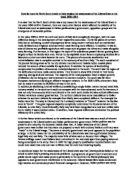The vision of a successful Liberal Italy was firmly rejected by the Liberals’ political opponents. Socialists condemned the regime as a cover for capitalist exploitation of the Italian working class. Wages were still very low and hours were long in comparison with the rest of Western Europe. Welfare benefits, such as sickness and pension payments, also compared unfavourably. The wealth of the country had been spent on attempts to control more land in East Africa and Libya, whilst severe poverty was still widespread. The fact that five million Italians had chosen to emigrate to the USA and South America in the period 1871 – 1915 confirmed the failure of the Liberalism to address the problem of poverty. Nationalists found the regime equally contemptible. It had failed to make Italy a major force on the European scene, incompetence had to led to a humiliating military defeat at the hands of the Ethiopians in 1896. Nationalists, along with Socialists, agreed that the vast emigration was a national disgrace. These emigrants were men and women whose energy should have been employed to build up the Italian economy. Nationalists believed that Liberals were only concerned about their own careers and private interests and they made deals with anyone who could further their selfish aims. Giolitti had allied with Socialists and Catholics and had shamelessly attempted to use the government’s powers to manipulate the results of general elections. Catholics were divided over Liberalism. Many found it difficult to support a regime which is 1870 had trampled over the Pope’s territorial rights in Rome. The introduction of the wider suffrage had encouraged the emergence of Catholic groups dedicated to helping the poor Catholic peasantry. Governments during the Giolittian era had granted monies to southern provinces to improve irrigation and the supply of drinking waters. Poverty remained a desperate problem, particularly in Sicily where 0.01 per cent of the population owned 50 per ccent of the land, leaving a mass of landless peasants. Some Catholics saw the Liberal regime as infinitely preferable to Socialism.
Regardless of the criticisms from the political opposition, the Liberals argued that Italy had made huge progress under the rule, particularly economically. The national income had risen from 62 billion lira in 1895 to 92 billion lira in 1915. Taxes on food had been reduced, and Liberal government had spent money to improve roads, railways and the supply of drinking water. However, Italy was still an agricultural country, with some 68% of the population dependant on the land for at least part of their livelihood.
Despite Giolitti’s reforms, 1914 saw the worst outbreak of mass unrest in 1898. In June the shooting of three demonstrators sparked off riots or demonstrations in most major cities. Some radicals seized control of government buildings, a general strike was called but the various Socialist groups failed to organise their protests effectively. The government had to use thousands of soldiers to restore order. ‘Red Week’, as it became known, displayed the social unrest and failures in Italy’s society. Some claimed that this failure shows that the Liberal regime had not satisfied key groups.
There was a large social and economic gap between the North and South, there was also large differences between the town and country. The Liberals were made up of mainly middle-class men from the North, meaning the peasants and those in poverty in the South were not represented in parliament. Although there was evidence that the Liberals had attempted to help poverty, the Catholics still had to help those in need.
The Liberal State had benefitted Italy to a certain extent, the working democratic system was an improvement to the previous political ruling and there was strong evidence of economic development. However, there were still a lot of existing problems which the Liberals had failed to deal with. The strong political opposition and criticisms showed that key groups were still unhappy with the country.







